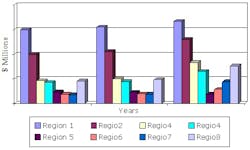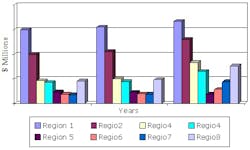Global medical aesthetic devices market to reach $6.2B by 2019, says new report
In a new report, BCC Research (Wellesley, MA) has revealed that the growing expansion of the middle classes in developing economies, shifts in cultural outlooks for developed economies, and regulatory actions in the U.S. have led to a rapidly changing global market for medical aesthetic devices. Due to the expansion of its middle-class population, India will experience the highest compound annual growth rate (CAGR) during the forecast period, with 18.3 percent. Injectable dermal fillers, surging at a 32-percent CAGR, will overtake breast implants as India’s largest market segment by 2019.
Related: Semiconductor diode laser advances enable medical applications
The U.S. will retain its position as the largest market for medical aesthetic devices, reaching $1.7 billion in 2019. Botulinum-based neuromodulators will continue to make up the largest segment of the U.S. market; they will also comprise the U.S. market’s highest-growth segment. Its share of the global market, however, will decrease from 33 percent in 2014 to 27 percent in 2019.
“In the U.S. and elsewhere, changes in the health insurance industry over the past decade have resulted in the reduction or elimination of coverage for cosmetic procedures,” says BCC Research analyst J. Richard Rahn. “People who desire cosmetic improvement may therefore seek less-expensive treatments, thus favoring the less-invasive procedures over surgery.”
A long-term trend, both in the U.S. and globally, is the moving away from surgical procedures and toward those that are followed by minimal downtime for the patient. An additional and growing concern is the risk of infection following an invasive medical procedure.
The report, "Medical Aesthetic Devices: Technologies and Global Markets," is available for purchase at www.bccresearch.com.
-----
Follow us on Twitter, 'like' us on Facebook, connect with us on Google+, and join our group on LinkedIn
Subscribe now to BioOptics World magazine; it's free!

